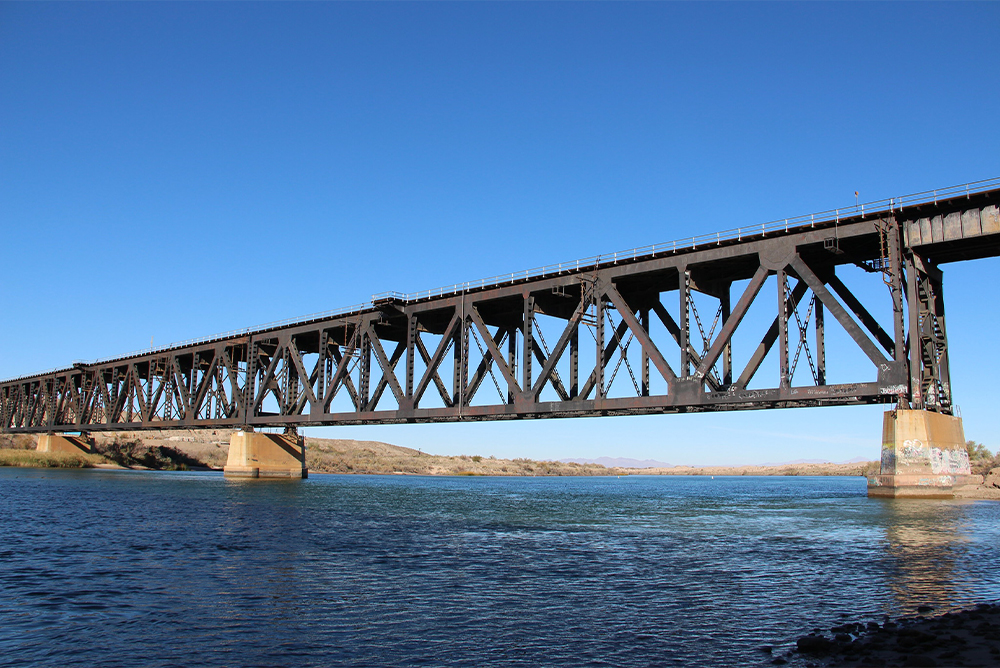
The West is essentially a Californian empire—which is why columnist Joe Mathews argues that the Colorado River’s name, and its future, should reflect that reality. Courtesy of C Hanchey/Flickr (CC BY-NC 2.0).
Why do we still call it the Colorado?
Sure, the river begins in the Colorado Rockies. But in law and practice, the waterway making headlines is clearly the California River. And the first provision of any deal to save the river should rename it accordingly.
This condition wouldn’t be about Golden State pride. Instead, a name change would more accurately reflect the imperial role California plays not only in the river controversy, but in the movement of water, people and power in the American West.
Right now, the Grand Canyon-sized divide over how to reduce the amount of water drawn from the rapidly diminishing river is being portrayed as a dispute between states, and as a contest between the power of politics and the power of law.
On one side, six states that rely on California-née-Colorado water—Arizona, Colorado, Nevada, New Mexico, Utah, and Wyoming—have come together to demand cuts in water use that would fall heaviest on California, which receives the largest share of the river’s water.
In response, California water officials have produced a plan that emphasizes how our state’s rights to the water are more senior than those of our Southwest neighbors. Their newly released plan would cut less from California’s take, and more from Arizona and Nevada. In the Wild West of Water, this argument—We stole it first! We stole it fair and square!—is a strong legal position.
But such descriptions of the fight fail to capture the true dynamics of the West. In matters of economy and demography, the six states are California colonies. Which makes this dispute less a fight between Californians and Arizonans, Nevadans, or Coloradans and more a civil war within California, with Californians on both sides of the fight.
To understand this river rift properly, start by seeing California for what it really is: the seat of a regional empire. The state of California, anchored by its major metropolises, is by far the richest and most dynamic area in this half of North America. With nearly 40 million people, California has more residents and a bigger economy than all the other western states of the U.S. put together.
In recent generations, California, like other great empires through history, has grown so much that it has exported people, money, and culture to nearby territories. California’s investment has helped make the intermountain West the nation’s fastest-growing region.
Many of the greater West are native Californians, or immigrants who came through the Golden State. Nevada is the most Californian state, with nearly as many California natives (20 percent) as Nevada natives (25 percent), and more than 90 percent of its population living within 50 miles of the California border. But Californians have also provided sizable percentages of new residents to Utah, Colorado, and especially Arizona, where one out of every 10 residents was born here.
Moving to the colonies is so common that the Orange County Register business columnist Jonathan Lansner often builds spreadsheets for his readers examining which of these colonies are doing best. (His latest advice? “Move to Colorado.”)
Are these transplanted Californians, and other residents of the California colonies, grateful for our largesse? Of course not. Colonists don’t freely thank their emperors, which is why every so often, the LA Times or New York Times interviews some real estate agent in Phoenix or Las Vegas or Denver, who whines about how the California ex-pats are driving up housing prices.
Oh, you denizens of western deserts and mountains, please forgive us Californians for making you wealthier!
With water, our successful colonization policies create headaches for us. We seized the water of the Western wilderness to build the world’s fourth-largest economy. But that wilderness is now full of former Californians and their communities, which now mercilessly seek a bigger share of the water.
“Revenge is profitable, gratitude is expensive,” Edward Gibbon observed in his classic History of the Decline and Fall of the Roman Empire.
Alas, the patently clear observation that Californians should keep the water because we do more things with it is not politically palatable in our colonies. Nor should we expect the president, from the tiny corporate tax haven of Delaware, to choose the grand needs of our great empire over the demands of those desert swing states, Arizona and Nevada.
Instead, we have little choice but to behave like wise empires, and do for our colonies what they won’t do for themselves. “The price of greatness,” the imperialist Winston Churchill observed, “is responsibility.”
The Golden State needs a better, future-focused answer to the colonies’ claims, especially with climate change drying up the Colorado and other rivers.
California must develop and finance a water plan not just for itself but for the West. This will mean more water recycling, more capture of stormwater, more desalination, and more water for ourselves and our colonies—so that our empire is no longer so dependent on that workhorse of a river.
All we’d ask in return is that everyone start calling our river by its proper name.




Send A Letter To the Editors